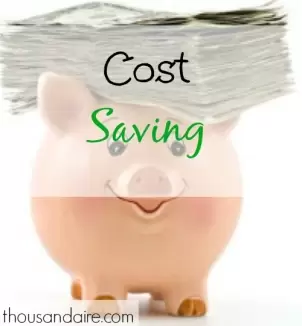
In personal finance we sometimes have an obsessive focus on cost savings. I think the focus comes from the fact that it’s often a blind-spot for folks when they get into budget trouble. People would always like to make more money. More money is a panacea for problems. People tend to equate cutting costs with cutting happiness. When given a magic lamp no one wishes for their costs to be zero, they wish for wealth. This attitude can spill over to your business as well. Landing new clients is sexy and exciting, but it’s crucial to keep your costs in control as well.
Differences Between Cost Saving in Business and Personal Finance
There are a few differences that we should note before we look into the similarities.
First off in personal finance its usually better to cut $5 of spending rather than make $5, just because of the way income taxes work. If you’re in the 25% bracket and I reduce your electricity bill by $15 per month that’s the same as getting a $20 per month raise.
A business doesn’t need to think this way. Since all costs to a business are tax deductible To a business a penny saved really is only a penny earned, while to your household a penny saved could be almost two pennies earned.
In personal finance most of your consumption is assumed to be directly related to your happiness. If you cut spending on going out to eat, it is seen as hardship because you’ll be less happy. In business the point is to maximize, in the long run, the gap between your revenue and your costs. Psychologically this makes it a little easier to cut expenses in business.
Difference Between Frugal and Cheap
In personal finance this isn’t so important. Everyone can decide what cheap means to them, and while you should make an effort not to be rude (don’t screw folks at the check in the restaurant), generally you don’t have to stay up at night worrying about it.
In business this is a constant worry. Is your ad-spend wasted? If I cut back on payroll is that going to cause revenue to drop more? If I don’t fund computer upgrades is that going to cost me more in hours worked? This isn’t at all easy, and you don’t even have the tax advantages available in personal finance. At every level from your side-business to mega-cap corporations people have a great deal of difficulty getting a handle on this. In part because the challenge increases with the business. If you do freelance writing, it’s pretty straightforward. Does my word processor work? If you’re running Coke it’s an endlessly confusing barrage of questions. Was the dip in profits associated with our new ad campaign, was it due to foreign exchange effects, are the departments reporting to me being honest about their budget needs or are they just trying to maximize their take.
Quick Cost Savings
If I had to pick an area for quick cost savings I’d look at energy efficiency, simply because it is eminently calculable. Utility rates are fairly stable, and if you use a 10 watt bulb instead of a 60 watt bulb you just have to multiply your usage by the power savings. IRR’s (internal rates of return) associated with this are all over the place. Solar panels with tax credits and current utility buyback rates can be north of 10%, but those buyback rates may not be sustainable. Moving from incandescent bulbs to CFL or LED bulbs can have an IRR north of 100%, it’s crazy.
Once you zone in here, there is a lot to find. Improving insulation generally offers a good IRR (north of 20%). Better windows are somewhat worse, generally around 10%. Buying a car on this basis is practically the worst idea. The cars with the best MPG are generally new and expensive. Buying an old smallish car is almost certainly going to work out better for you.
The other quick way to save some money, I’m sure you’ve all heard before, is to start making phone calls to company’s that charge you monthly bills. Generally their ongoing costs are very low, but their customer acquisition costs are high. Line level employees are often given sweeping powers to discount your bill for long periods of time. Obvious targets for this are: your internet subscription, your gym subscription, and your phone subscription.
You may have noticed that I didn’t mention your TV subscription. That’s because you don’t call to discount your TV subscription, you call to cancel your TV subscription.
If you have any idea’s for cost savings please don’t hesitate to point them out. I’m always on the lookout for more efficiency in my finances.
Powered by Linky Tools
Click here to enter your link and view this Linky Tools list…
Adam Woods is a physicist. His research interests include building software to run and build geomagnetic models. Adam got interested in personal finance in the great recession when it became obvious an interest was necessary.
After harassing his friends and family (and a short intervention) he took to the web where he blogs about finance, investment, politics, and economics.
Adam is currently located in Boulder, Colorado where he can generally be found hiking, biking, or running a D&D campaign. He can also be contacted at adamwoods137@gmail.com.


Good points – one other thing I would say is that it makes sense to maximize your revenue as well.